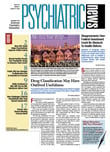When massive numbers of veterans return from combat in Iraq and Afghanistan, addiction psychiatrists will face challenges in treating many young men and women with coexisting substance use disorder (SUD) and posttraumatic stress disorder (PTSD), according to experts at the annual meeting of the American Academy of Addiction Psychiatry last month.
It is difficult to predict the burden of the two wars on the mental health care system in the next decades. John Renner, M.D., an associate professor of psychiatry at Boston University School of Medicine and associate chief of psychiatry for the VA Boston Healthcare System, noted that there were at least 1.6 million military personnel involved in the Operation Enduring Freedom and Operation Iraqi Freedom from 2002 through February 2008, according to Department of Defense data. Veterans Affairs' (VA) records show that 9 percent of all discharged veterans, amounting to approximately 75,000, have been given a PTSD diagnosis for the same period.
VA data also indicate that of the nearly 325,000 veterans who have been treated at VA medical centers, 17 percent have been diagnosed with drug abuse not meeting the criteria for dependence, 3.4 percent with alcohol dependence, and 1.5 percent with drug dependence. Renner believed that these estimates may not capture the full extent of the SUD problem, because studies of Vietnam veterans have found that up to three-quarters of combat veterans with PTSD also met criteria for SUD.
“We can't necessarily assume the problems [in current war veterans] will be the same as in past wars,” Renner said. Combat participation in Iraq and Afghanistan poses significantly different risks of PTSD and SUD than combat during the Vietnam and Korean wars. For example, the duration of active service in Vietnam was limited to 12 months, while many of the military personnel in the current conflicts have had prolonged duty and sometimes repeated tours in the combat zone, which increases the risk for PTSD, Renner pointed out. In addition, far more veterans have been exposed to more constant, pervasive stress in unpredictable, unconventional conflict situations in the current wars compared with those in the Vietnam war, in which only about 10 percent of military personnel were on the frontline and under acute stress.
Current veterans also have certain protective factors. They are all volunteers and on average older, better educated, and more cohesive within their units and have better public support at home than did Vietnam veterans. Another important factor is an unprecedented percentage (12 percent) of women now in combat. All of these unique conditions may present psychiatry with challenges.
Jason Ourada, M.D., a fellow in addiction psychiatry at Boston Medical Center, illustrated the importance of multidisciplinary coordination and building a therapeutic alliance when treating current veterans with comorbid SUD and PTSD. Complex, multiple psychiatric disorders may go beyond combat-related stress and trauma that must be teased out with the help of patients themselves, families, and other health care professionals. Unfortunately, addiction psychiatrists often have to rely on case notes to obtain crucial patient history in a “fractured care system” and on reports from multiple clinics, each treating the patient for a particular diagnosis.
“It can be difficult to distinguish symptoms of PTSD and other psychiatric disorders,” Ourada pointed out. Intrusive thoughts and anxiety, for example, may be caused by amphetamine, cocaine, or cannabis intoxication, alcohol withdrawal, or PTSD. It takes a lot of time, patience, and collaboration to sort out accurate diagnoses, especially for recently returned veterans, he said. ▪
